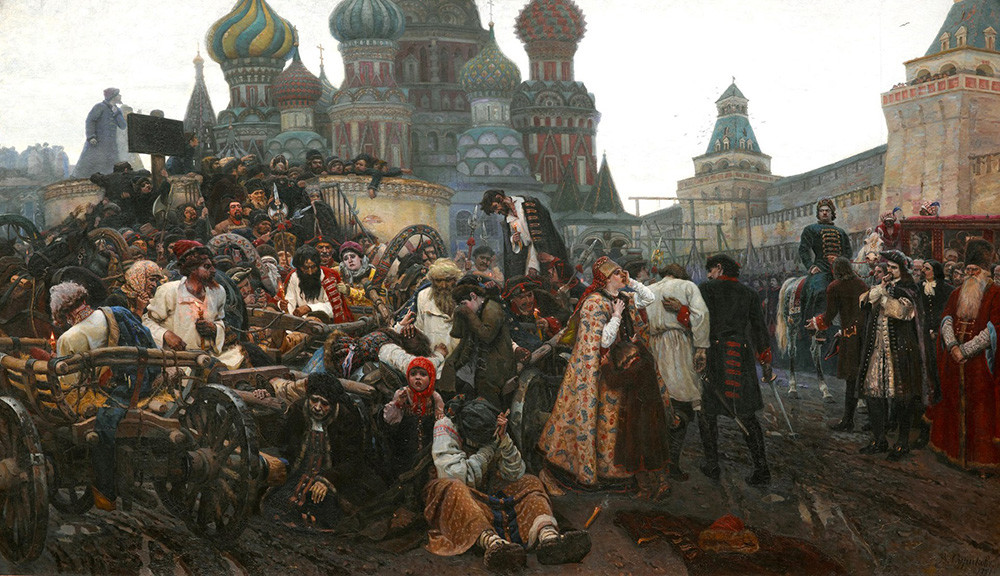China
Canada imposes retaliatory tariffs in response to US levies
![]()
![]()
![]()
![]()
![]()
![]()
![]()
![]()
Canada imposes retaliatory tariffs in response to US levies
Canada is imposing retaliatory tariffs in response to US levies. The new measures include tariffs on vehicles, the official website of the Canadian Ministry of Finance reports.
Today, April 9, Canada introduced retaliatory tariffs on vehicles from the US in response to new trade restrictions imposed by the US government.
A 25 percent tariff will be imposed on all cars that do not meet the requirements of the Canada-United States-Mexico Agreement (CUSMA), as well as on vehicles that contain materials not sourced from Canada or Mexico.
Prime Minister of Canada Mark Carney stated that this move is in response to the trade crisis caused by US President Donald Trump's policies.
"President Trump caused this trade crisis - and Canada is responding with purpose and with force," Carney noted in his social media post on X.
Finance Minister François-Philippe Champagne also announced that the new countermeasures, announced last week in response to the US tariffs on Canada's automotive industry, came into effect on April 9.
"Canada continues to respond firmly to all unjustified and unreasonable tariffs imposed by the United States on Canadian goods. The government is firmly committed to the swift removal of these US tariffs and to protecting Canadian workers, businesses, the economy, and industry," Champagne emphasized.
Tariff war between US and Canada
On Saturday, February 1, US President Donald Trump signed an executive order imposing a 25% tariff on Canadian and Mexican imports, as well as a 10% tariff on goods from China. The restrictions were set to take effect on February 4.
The plan also includes the imposition of a 10% tariff on energy products from Canada.
Earlier, Canadian Prime Minister Justin Trudeau promised immediate countermeasures if the Trump administration imposed tariffs.
Reference: Story by
How black people first came to Russia
![]()
![]()
![]()
![]()
![]()
![]()
![]()
![]()
![]()
How black people first came to Russia
Russia didn’t have black slaves, or slaves of any kind, for that matter. All the labor needs of the ruling class were met through a system known as serfdom (unlike slaves, serfs owned property and were subjects under law). So, the first black people in Russia performed a different function – they were seen as an object of wonder, a curiosity and something exotic from overseas.
'The Morning of the Streltsy Execution,' 1881, by Vasiliy Surikov (1848-1916).
Tretyakov Gallery
In Vasily Surikov’s painting The Morning of the Streltsy Execution, behind young Tsar Peter there is a carriage upholstered in red velvet and, inside it, a female face is visible: One of the royal women has come with Peter to see the execution. And on the running boards of the carriage are two black pages (servants) in turbans with blue feathers.
Could one of them be Abram Gannibal (1696(?) – 1781), best-known as the great-grandfather of the great poet Alexander Pushkin? Unlikely. Whether Gannibal was brought by Peter from Europe in 1698, or given to him as a gift in 1705, he was never a member of the retinue of the tsarevnas (Russian princesses). Does that mean that having black pages was already a tradition at the end of the 17th century? Yes, it does, and the names of Tsar Peter’s first black pages when he was young and lived in Moscow are mentioned by historian Ivan Zabelin. They were Tomos, Sek and Abram. Unfortunately, this is all we know about them.
“He was as black as night”
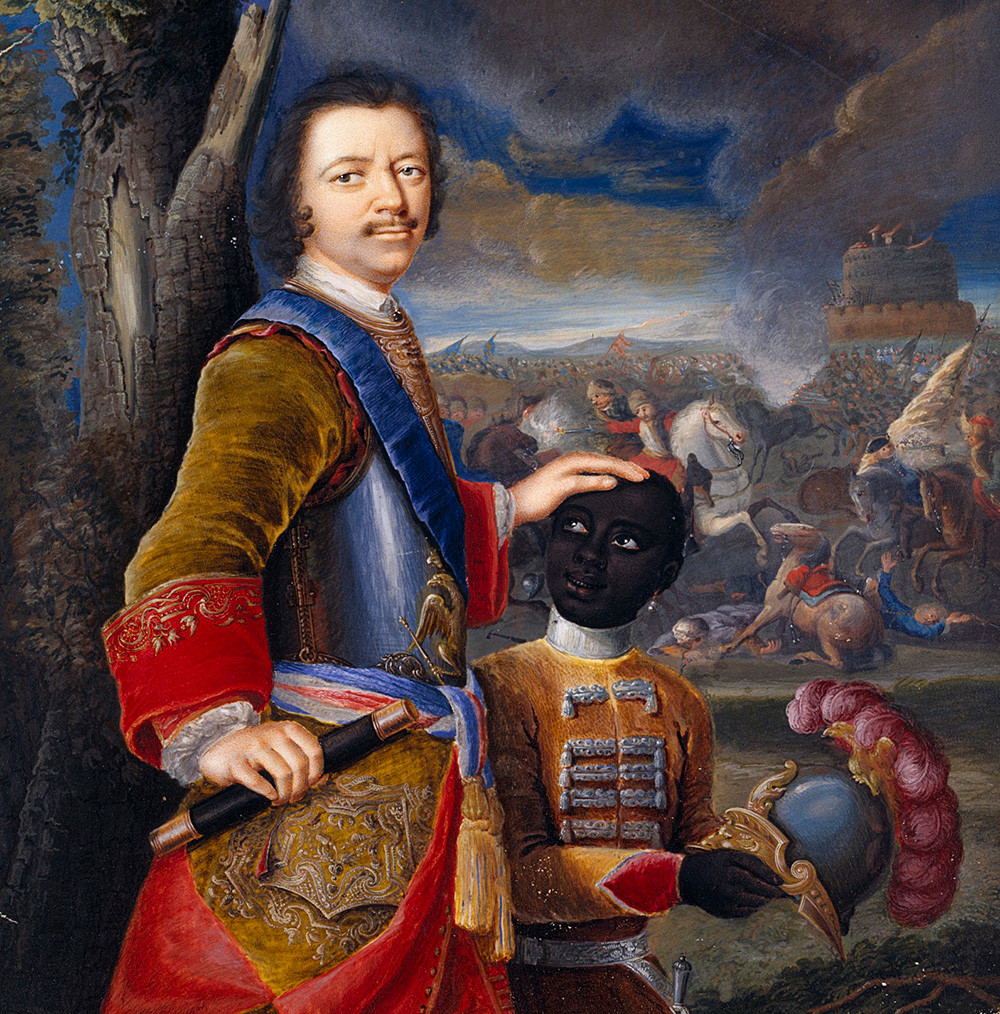
Peter the Great with his page Abraham Hannibal, ca 1720.Victoria and Albert Museum
In the retinues of European kings, black servants first appeared at the time of the Crusades. They were also employed in this capacity in Russia. There is evidence that there were Moors residing in the apartments of Sister Martha, mother of first Romanov Tsar Mikhail Fyodorovich (Michael of Russia). In the female half of the palace, black people performed the same function as dwarfs, holy fools and wandering pilgrims - they were objects of astonishment and entertainment for the bored women of the royal family forced to spend almost their entire life locked up in their private quarters.
The Tsars, too, kept Moors for entertainment. According to a historian of Moscow, Ivan Zabelin, Mikhail Fyodorovich had Moor Murat and later Moor Davyd Saltanov residing at his court, on whom he lavished sumptuous clothes. Among Tsar Michael’s servants were Moors who had arrived in Russia as elephant handlers (Oriental rulers loved to give elephants as gifts to Russians). According to records, in 1625 and 1626 a Moor named Tchan Ivraimov “entertained” the tsar, showing him the tricks his elephant could perform.
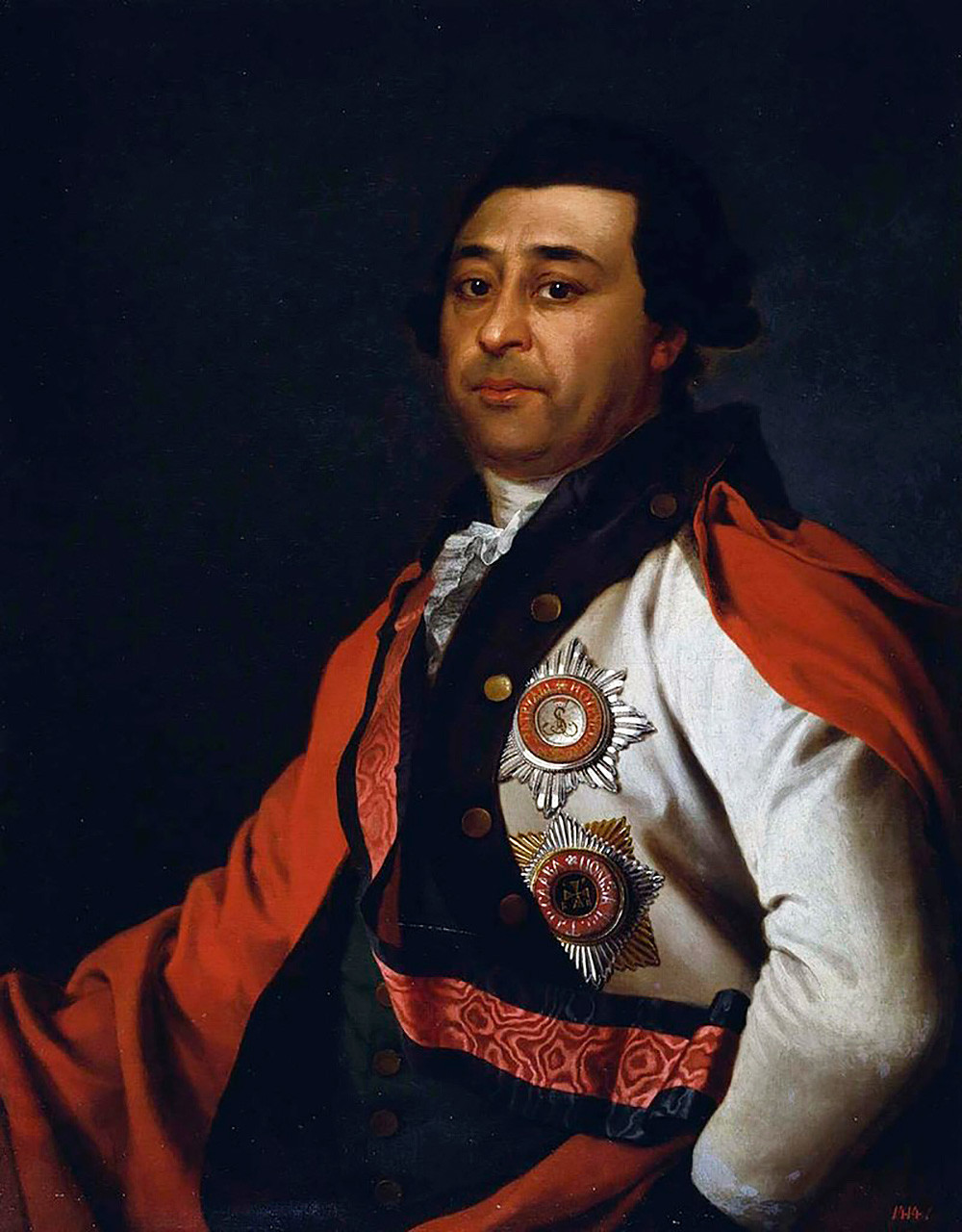
'Portrait of Ivan Hannibal, Abram Hannibal's son' by Dmitry LevitskyPalais de Pavlovsk
A black woman lived at the court of Michael’s consort, Tsaritsa Eudoxia, and Alexei Mikhailovich (Tsar Alexis of Russia) kept a Moor named Savely, whom he sent to learn Russian, and the latter mastered reading, writing and singing sacred verse in Russian in just one year (and at the time, the Russian language was more difficult than it is today). Still, in the 17th century, Moors of the court were educated as a sort of amusement. It was Alexei Mikhailovich’s son, Peter the Great, who gave the Moors, as well as people of other nationalities, a very real opportunity to advance and make a career in Russia.
If there is anything in which Abram Gannibal was the first among black people in Russia, it was his career. Initially, before 1714, he was mentioned alongside court jesters, but soon afterwards, Tsar Peter must have discerned the young man’s abilities. He started to entrust him with various tasks and then sent him to study engineering in France. In later years, Gannibal taught Russians mathematics and engineering, and under Empress Elizabeth Petrovna, he was put in charge of all engineering in Russia.
Without a doubt, Gannibal was an outstanding individual – by the end of his life, he had become a general and the father of a large family (above, you can see a portrait of his son Ivan), and he was the first person in Russia to start growing potatoes on his estate.
Moors of the Imperial Court
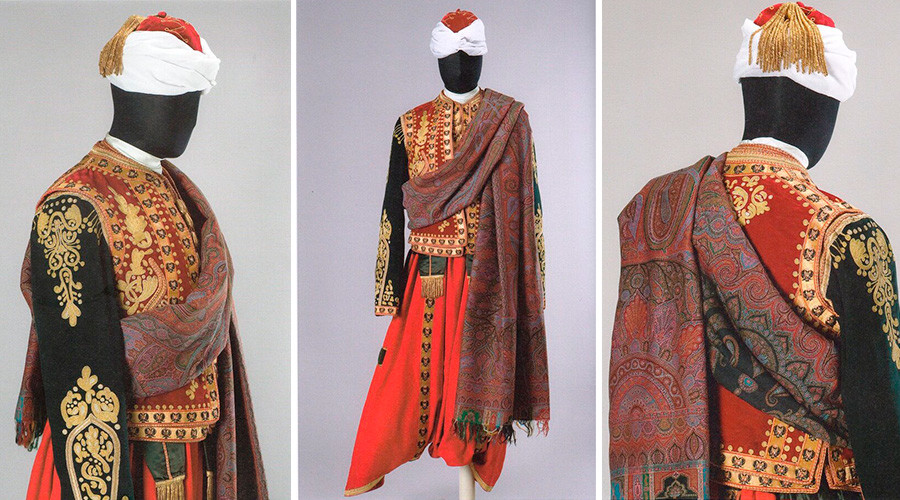
The daily uniform of the Moors of the Imperial Court: State Hermitage
By the mid-18th century, there were already quite a few black people with positions at the court: Catherine I had six Moors (they usually escorted her when she climbed out of her carriage); at the court of Anna Ioannovna there were four; while black couriers, black stokers and black musicians were to be found during the time of Elizabeth Petrovna. Moors would attend to Elizabeth when she went out hunting, her favorite pastime.
Under Catherine II, when the number of Moors appointed to the court reached two dozen, a special court position was instituted: ‘Moor of the Imperial Court’. At first, holders of this position were referred to as “Araps”, but in the 19th century it became customary to use the spelling “Arabs”, although it is unlikely that any ethnic Arabs were among them. Men as tall as possible and with the blackest possible skin were selected for the job. On assuming office, they had to adopt Christianity (either Orthodox or Catholic was allowed).
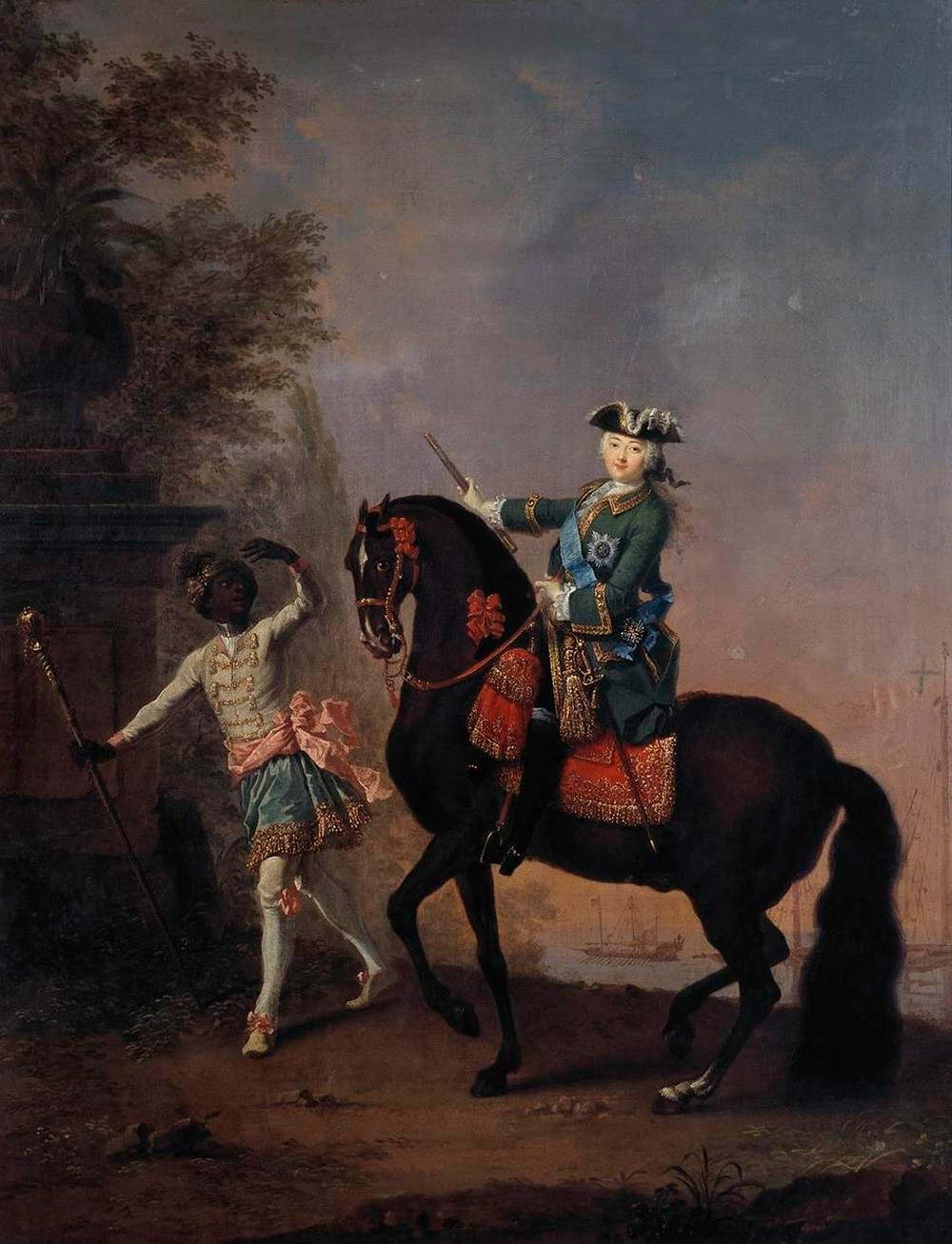
'The Empress Elizabeth of Russia on Horseback, Attended by a Page,' 1743, by Georg Christoph Grooth (1716-1749)
State Russian Museum
Moors attended the royal household on its travels, and their main duty was to open doors for the monarch at official ceremonies. And the Moors of the Imperial Court had the most sumptuous uniforms at court. According to Professor Igor Zimin, “at the end of the 19th century, under Alexander III, the ceremonial court uniforms of the Moors were the most expensive among all the court servants, and cost the treasury 543 rubles.” Only the uniform of a chamber fourrier, who was in charge of all the servants (408 rubles), and of a chamber Cossack (bodyguard) of His Majesty (418 rubles), were close to this in cost. In comparison, an ordinary man’s suit cost 10-15 rubles at the time. And the wages of the Moors of the Imperial Court ranged from 600 rubles (Junior Moor) to 800 rubles (Senior Moor) a year.
“Senior” and “junior” referred only to grades within the same rank. In the 19th century, black children - “little Araps” - were no longer kept at the court; people who came to serve as Moors of the Imperial Court were all adults. When John Quincy Adams arrived in St. Petersburg in October 1809 as the United States Minister to Russia, the first black Americans appeared at the Imperial Court. Among them was Nero Prince, one of the founders of the African Masonic Lodge in America. His wife Nancy Prince came with him. The family of the Moor of the Imperial Court had a comfortable lifestyle and even had servants.
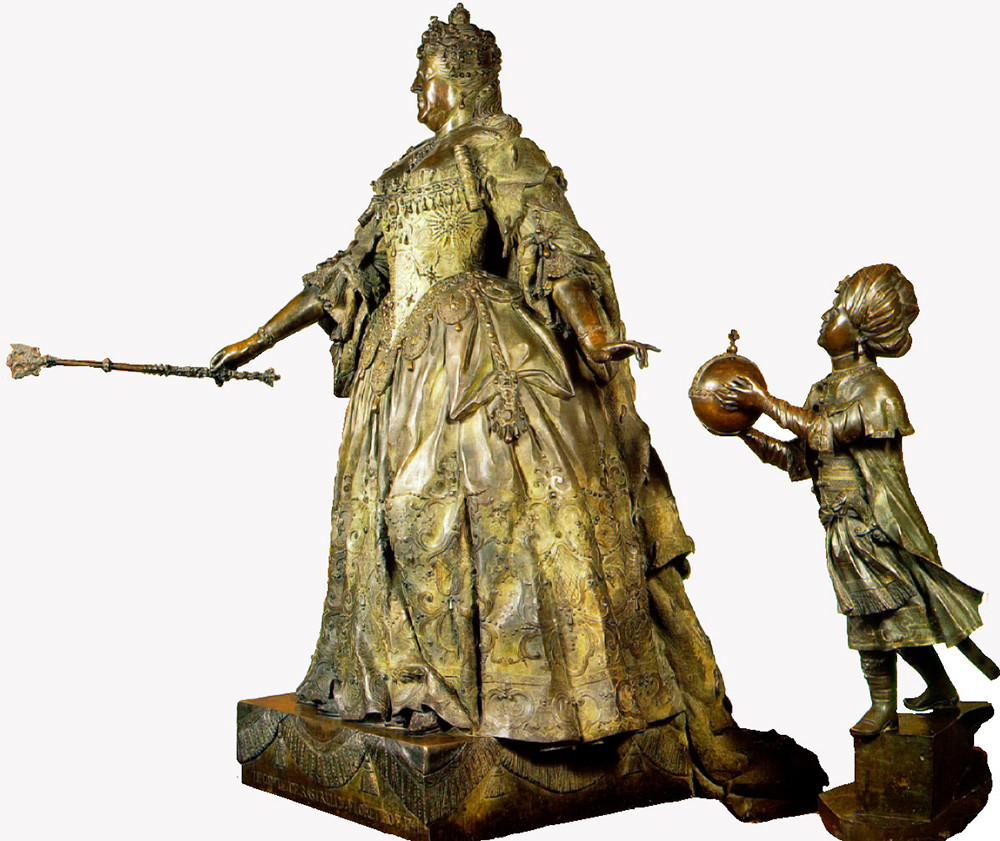
'Anna Ioannovna with a Moorish Boy,' bronze statue, 1741, by Carlo Bartolomeo Rastrelli
State Russian Museum
Nancy left a brief//digilib.nypl.org/dynaweb/digs/wwm97263/@Generic__BookView" style="padding: 0px; margin: 0px; background: transparent; color: rgb(238, 48, 72); text-decoration: none; border-bottom: 1px solid transparent; line-height: 0;"> description of her visit and Russian customs. She witnessed many celebrations and ceremonies at the Imperial Court, and saw the 1824 flood in St. Petersburg and the 1825 Decembrist revolt. She surprised Russians with her refusal to dance at parties, believing it was a sin for a Christian. No matter how hard the Russians tried to persuade her, Nancy remained adamant. In 1833, she went back to America, as she found the St. Petersburg climate too harsh. In 1836, her husband followed her, having served at the Russian Imperial Court for almost 20 years.
His Majesty’s hookah pipe
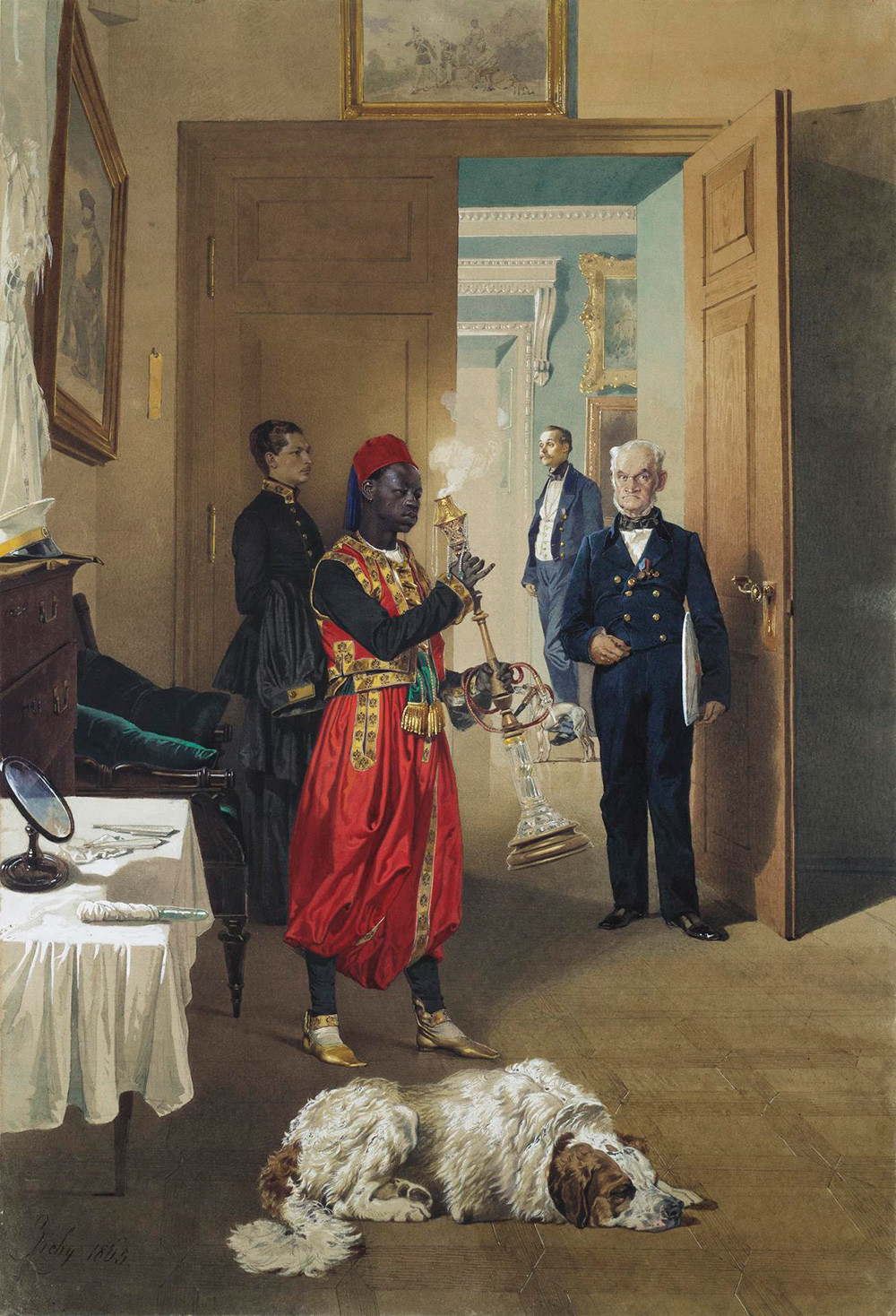
'Ante-Room in the Imperial Palace at Tsarskoye Selo,' 1865, by Mihály Zichy (1827-1906)
State Hermitage
In the Winter Palace, the Moors appointed to the court were usually on duty in the Arabian Hall. Their daily routine was not onerous - ceremonial occasions on which they had to open doors did not happen that often. Sometimes they were asked to escort palace guests to the apartments of the emperor.
During the reign of Alexander II, the Moors had another permanent duty - to prepare a hookah pipe for the emperor. Alexander had digestive problems and smoking helped him with this malaise. Besides, the emperor just enjoyed smoking and valued the Moors at court for the skill with which they mixed his tobacco for him.
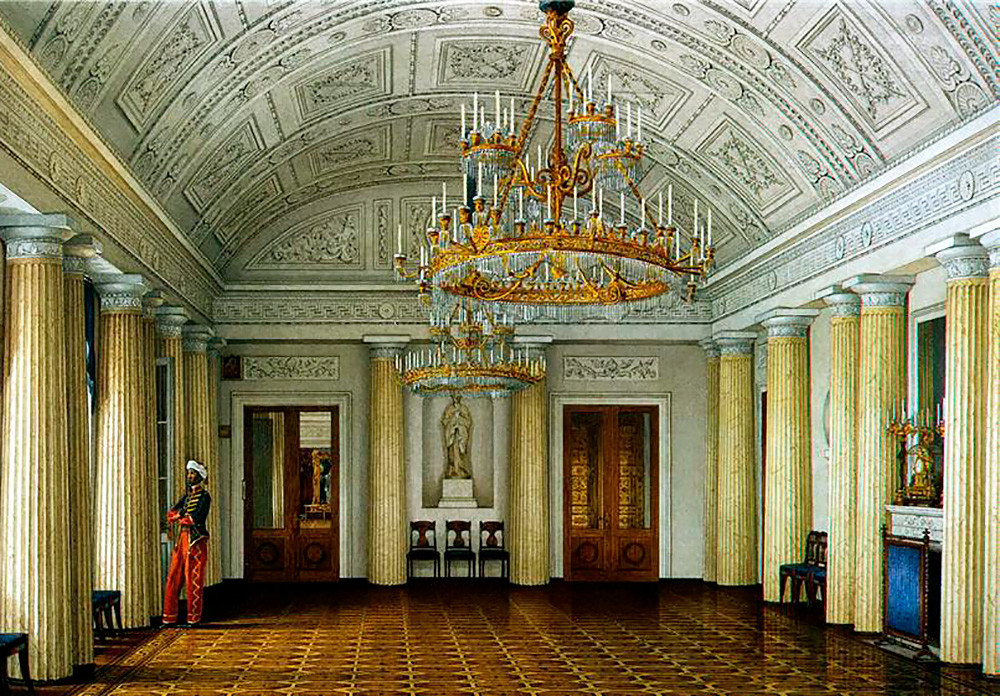
'The Moorish Hall, the Winter Palace,' by Konstantin Ukhtomsky
State Hermitage
Another traditional duty the Moors carried out was placing presents under the Christmas tree in the Winter Palace: The Moors were intended to symbolize the kings from the east, the Magi, who brought gifts at Christmas.
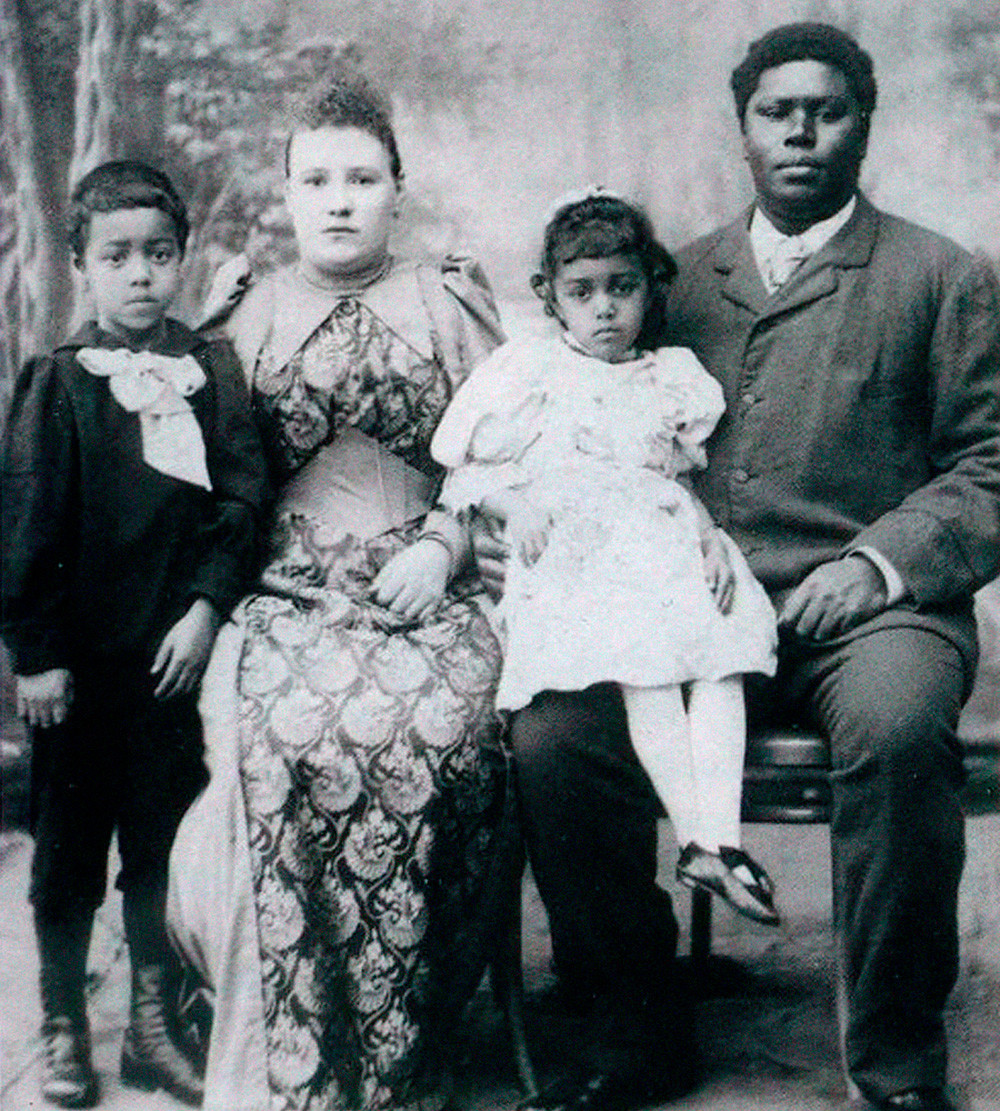
George Maria (1858-1916), one of the Moors of the Imperial court, with his Russian wife and children.Archive photo
At the beginning of the 20th century, spending on the Moors in attendance at court was reduced, and only four remained on permanent duty. The descendants of the Moors of the Imperial Court, who often took Russian wives, still live in St. Petersburg.
Reference:www.rbth.com/history/331796-how-black-people-came-appeared-russia
James Cleverly faces barrage from BBC presenters as new Home Sec sworn at in frosty interviews
![]()
![]()
![]()
![]()
![]()
![]()
![]()
![]()
![]()
James Cleverly faces barrage from BBC presenters as new Home Sec sworn at in frosty interviews
Following the Supreme Court's ruling that the government's Rwanda plan for asylum seekers was "unlawful", it was left to new Home Secretary James Cleverly to face the media on Thursday morning.
Judges sat on the Supreme Court unanimously decided that Rwanda was not a safe third country for illegal migrants to be sent to while the court's president Lord Reed ruled there would be a risk of the country returning genuine asylum seekers to face “ill treatment” in the nation they'd already fled from.
The government isn't expected to take the ruling lying down, with Jacob Rees-Mogg revealing a plan to "legislate" against the verdict while Lee Anderson has suggested Rishi Sunak "ignores" the ruling.
Cleverly was the government's mouthpiece amid the saga on Thursday morning, appearing on BBC Breakfast and Radio 4's Today programme where he faced grillings from Charlie Stayt and Amol Rajan, respectively.
During the Radio 4 interview, Cleverly found himself at loggerheads with Rajan as the pair became embroiled in an on-air bust-up due to the BBC presenter's manner.
"It's hard to overstate how far your position is from a Supreme Court in this country," Rajan said during their interview before he read aloud a section from the Supreme Court's ruling yesterday.
In it, the ruling said "Rwandan officials" who'd taken part in training as part of the government's scheme's plans "had very limited or no understanding of how to assess refugee status".
Cleverly attempted to respond to the statement but he and Rajan ended up talking over one another as the BBC presenter scrambled to move the conversation on.
"Are you asking questions or are you making statements?" Cleverly blasted. "Because if you're just going to make a statement I can go and get a cup of tea."
"You're making statements, I'm trying to ask questions," Rajan said but Cleverly stood firm: "I am here. I want to answer questions but you're making statements and then moving on without giving me an opportunity to address the statements that you make, a number of which I disagree with."
WATCH NOW: Charlie Stayt asks if Cleverly said 'bats***'
Rajan replied: "They are not my statements. I am reporting what people like Jonathan Sumption have to say."
The pair's conversation moved on but it wasn't the first time Cleverly found himself clashing with a BBC star on Thursday morning.
During his interview with Stayt on BBC Breakfast, the presenter asked: "As you're aware, some things attract more attention maybe than they deserve.
"But yesterday in the Commons, you were accused of describing the Rwanda system as bats***.
"Is that true? Did you say those words?" Stayt added while a surprised Cleverly replied: "Well, that was a claim made of me, not something that I said, but the point is..."
"You didn't say that?" Stayt interrupted as Cleverly tried to continue. "But the point is... look, it's good for parliamentary theatre.
"The point that I said is, and I repeat it, the Rwanda scheme is already having a deterrent effect.
"When we operationalise it, when we get those flights taking off, it will have an even greater deterrent effect, and it will be part of the toolkit that is seeing the applications sped up, the returns increased, the number of raids on illegal employment - people employing illegal migrants - significantly increased to 70 percent.
"This as I say, is a really important part of a range of activities cracking down on illegal migration, and it is working."
Stayt referred back to his initial question as he repeated: "I am very happy to give you the time to answer the question I just asked you, did you say that word?"
"I don't remember," Cleverly hit back. "I certainly don't remember saying anything anything like that.
"But then the point is, this is a really important part of our plan, which is already working."
Reference: GB News: Alex Davies
Articles-Popular
- Main
- Contact Us
- Planetary Existences-2
- Planetary Existences
- TWO REVELATIONS-2
- Jeffery Epstein - The Saga - 9
- Jeffery Epstein - The Saga - 8
- Jeffery Epstein - The Saga - 10
- The Two Revelations
- The Fourth Way - Study of Oneself - P.D.Ouspensky
- Impeachment Investigators Subpoena White House - Ukraine
- Universality of Initiation
- The Path Of Initiation
- The Participants In The Mysteries-2
- Initiation and the Devas
- The Fourth Way - Wrong Functions - P.D Ouspensky
- The Final Initiation
- Statues are a mark of honour. Like Edward Colston, Cecil Rhodes and Oliver Cromwell have to go
- Discipleship - Group Relations - 2
- The Probationary Path - 2
- The Participants In The Mysteries
- Discipleship - Group Relationships
- Discipleship
- The Succeeding Two Initiations
- Jeffery Epstein - The Saga - 7
- Jeffery Epstein - The Saga - 6
Articles - Latest
- They Lied to Us! The Truth They Hid About Hitler’s Death — Gerard Williams
- Ramaposa Dragged Out of Parliament
- Madagascar Goverment Collapse
- The Reality of Digital Id
- Welcome To The End Of Western Dominance
- Why is the Sahel turning its back on France?
- Sarkozy gets 5 years in prison in Gadhafi case
- The EU in 2025: A union at the crossroads of chaos
- Deep distrust of EU leaves Italy's Meloni in a corner over bailout fund
- Regime crisis in France: Bayrou falls, now Macron must go!
- Idi Amin president of Uganda
- Anger at Starmer's 'surrender deal' that hands Spain control over Gibraltar border
- Iran doubles down as US signals Israel could strike during nuclear talks
- What could have caused Air India plane to crash in 30 seconds?
- WW3 fears explode as Britain now Russia's 'enemy number 1' - even ahead of Ukraine






